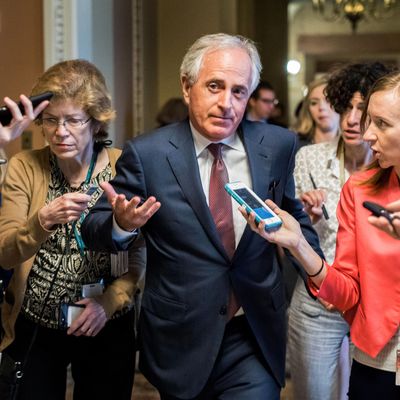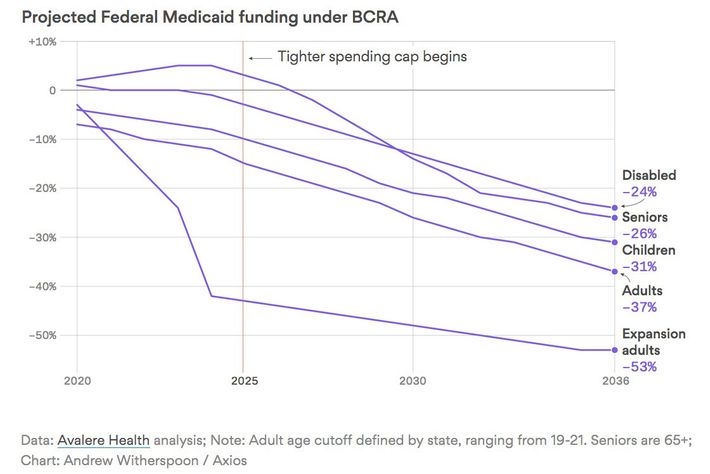
Republicans have justified their health-care rollback as a “rescue mission” to save America from a “failing” law. Their insistence that the Affordable Care Act is collapsing on its own is demonstrably false. But even if it were correct, the case is a non sequitur, because the most significant changes in the law have nothing to do with the alleged failure of Obamacare. Throughout the health-care debate, Republicans have managed to submerge this disconnected, obfuscatory rhetoric. But now the lie is finally coming to the surface, and the willingness of Republicans to indulge it is dissolving.
Obamacare has two different programs for covering the uninsured. Medicaid covers the poorest ones (with incomes below 133 percent of the poverty line). Those above that line can get tax credits to cover their insurance, which is sold on exchanges that are regulated to ensure people with expensive medical needs can’t be excluded or charged higher prices. When Republicans insist Obamacare is “failing,” they mean the exchanges. In reality, only some states have trouble with exchanges, and analysts believe the main cause is deliberate sabotage by the Trump administration, which Trump himself has boasted about openly.
The Republican bill does have some measures to shore up the exchanges. It would authorize payments to insurers that have disproportionately sick customers — payments included in the Obamacare law but which Republicans have managed to block — and create a $100 billion stability fund. These measures have bipartisan support. If they were passed as a stand-alone bill, the exchanges would be fine.
“It’s unfortunate that our Democratic colleagues refused to work with us in a serious way to comprehensively address Obamacare’s failures,” says a pious-sounding Mitch McConnell.
But, of course, Democrats do support measures to address Obamacare’s failures. They support the exact steps in McConnell’s bill. What they don’t support is the other parts of the bill: mainly a half-trillion-dollar tax cut for wealthy investors, offset with cuts in Medicaid and the tax credits. While those policies may advance long-standing conservative policy goals, they have no plausible relation to the alleged “collapse” of Obamacare.
The reason for this bait and switch is clear enough. The tax cuts for the rich and reductions in health-care subsidies that McConnell wants to smuggle into a bill patching up the exchanges are hideously unpopular. His plan is polling in — or in one case, even below — the teens. (To be sure, the one case is a poll showing public support at just a single point below the teens.)
This level of public unpopularity for a major piece of legislation is without precedent. And the Republican Congress is cracking under the weight of it.
Vulnerable Senators are revolting against the bill’s tax cuts for the rich. Several Republican Senators have begun agitating in private and in public to take out the investment tax break, the elimination of which would reduce pressure for subsidy cuts. “It’s very important to me in the initial draft bill if you looked at lower-income citizens … they were going backwards,” Senator Bob Corker told reporters. “And at the same time the 3.8 percent tax on the wealthy was being done away with.”
Corker now says he expects the tax cuts to disappear from the bill. “This would free up some extra funding to help coverage levels,” reports Axios, “and would also help combat the narrative that the bill cuts coverage for the poor to give money to the wealthy.” By “narrative,” Axios means “arithmetic fact, as evidenced by the first clause in that sentence, which concedes that eliminating the tax cuts for the rich would enable smaller cuts in subsidies for the poor.”
The second question is whether the bill will enact Medicaid cuts after ten years. This is another policy change conservatives want that is completely unrelated to Obamacare altogether. Both the House and Senate bill have a big, regressive tax cut and finance it by reducing tax credits for the exchanges and phasing out the Obamacare Medicaid expansion. The Senate bill goes farther. It reduces the pre-Obamacare spending rate on Medicaid starting in 2025.
Republicans have denied that this would constitute a “cut,” arguing that the raw dollar totals would rise. But this is pure sophistry. Medical costs have historically grown faster than the cost of other goods. (The principle for this is called Baumol’s cost disease, and it holds that labor-intensive services, like medicine, become more expensive over time relative to the cost of goods that can be manufactured.) Medicaid is much cheaper than other forms of insurance, and it has grown at low rates, but it still needs more dollars to keep pace with a growing population. Avalere, a health-care consulting firm, broke down how the cuts in the Senate bill would reduce Medicaid services over time for different kinds of beneficiaries. The effects are brutal. (Chart compiled via Axios):

Why would Republicans put these cuts into a bill whose ostensible purpose is completely unrelated? Because this is their chance to do it. Medicaid is the softest target in the welfare state, a program serving a more vulnerable constituency than Medicare or Social Security. In March, Paul Ryan said, “Medicaid, sending it back to the states, capping its growth rate, we’ve been dreaming of this since I’ve been around — since you and I were drinking at a keg.”
Medicaid is never going to be easy to cut, which is why the Senate bill back-loads its cuts far into the future, allowing current Republican officeholders to be insulated from their brutal effects. It is hard for Republicans to imagine a better chance to cut Medicaid than using the “collapse of Obamacare” as a cover.
Numerous Republican governors have denounced the deep Medicaid cuts in the Senate bill (which actually go even farther than the cuts in the House bill.) Chris Sununu, the Republican governor of New Hampshire, all but calls out the bait and switch in the bill. “The country is looking for reform on Obamacare,” he tells Time. “That’s where the sole focus needs to be. This goes beyond that.” Ohio senator Rob Portman has expressed concern — perhaps pressured by his state’s Republican governor, John Kasich, who has denounced the plan.
Medicaid has split the party. Pat Toomey, Pennsylvania senator and former president of the Club for Growth, a lobby for extreme libertarian policy, has urged the inclusion of the long-term Medicaid cuts. Toomey reportedly lashed out at Portman. The Wall Street Journal, a longtime ally of Toomey’s plutocratic worldview, amplifies Toomey’s attack on Portman today.
When McConnell warns his party that the alternative to failure is bipartisanship, it sounds comical to outside ears. But he is deadly serious about it. He is telling conservatives that they are on the verge of forfeiting a historic opportunity to use the pretext of Obamacare repeal and replace to fulfill longstanding goals. The least committed conservatives in his party seem unwilling to risk their own popularity for these audacious goals. “If for some reason it fails … the floodgates would probably open to reach a bipartisan compromise,” West Virginia senator Shelley Moore Capito said on CNN. The term “floodgates” is telling. It indicates built-up pressure to abandon ideological maximalism and instead try to actually improve Obamacare.
McConnell is trying to use the urgency of a deadline to force through a law enabling his grandest ideological dreams. Instead, the pressure of timing may have opened up a schism within his party he cannot mend.






























